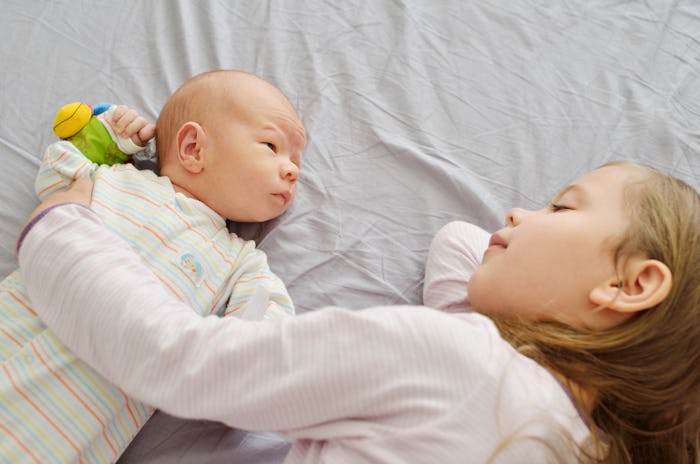Life

How To Sleep Train If Your Baby Shares A Room With A Toddler, According To An Expert
It's been said that sleep is the new sex, a comparison many parents of young children can identify with. Those with babies and toddlers who wake up during the night or resist going to sleep in the first place often find themselves obsessed with sleep the way they used to obsess over sex — getting it, improving it, and wondering how much other people get. When you welcome a second baby into your family, you have to slay the sleep dragon all over again, and there are different challenges, like figuring out how to sleep train if your baby shares a room with a toddler. Parents pointed out that a strategically-placed white noise machine might be enough to solve the problem, since toddlers are difficult to wake from deep sleep, but the fear of baby waking up big brother or sister is real. Romper spoke with Christine Stevens, a Certified Sleep Consultant and founder of Sleepy Tots Consulting, to get expert tips on sleep training baby number two, whether your kids share a room, a wall, or you're worried that baby's cries will be loud enough to fill your whole home.
The first thing to keep in mind, says Stevens over email, is that "while it [sleep training] may be tough in the short term, the goal is for everyone in the home to get the sleep they need." This is true whether you have one kid or five. Think back to the babyhood of your first child. Whatever approach to sleep or sleep training you took, your choices were informed by wanting good sleep for yourself, for your partner if you have one, and also for your baby. Now that you're helping a second baby learn to fall and stay asleep on their own, the same bigger picture applies. Every member of the family needs to sleep well.
So what can you do after the birth of a second child to work toward the goal of a well-rested family? Stevens recommends "introducing healthy sleep habits, such as getting enough naps and encouraging full feeds when baby is around 6 weeks old, and getting baby on a schedule after 4 months of age." She adds that sleep training can happen anytime the current routine isn't working and you're ready for a change. So families with an older sibling who still has sleep problems may need to think about sleep training for their first child in addition to the new baby.
When a baby and toddler share a room and parents worry that the younger sibling will interrupt the older child's sleep, Stevens has some advice:
"To minimize disruption to an older child while sleep training, I recommend moving the older child into the parents' room or another room temporarily. If your children's bedrooms share a wall, talk with the older child and let him/her know you're going to be helping the younger sibling to sleep better and that there may be some extra crying for a few nights. It shouldn't create new issues for the older child."
To learn more about the gentle sleep training methods Stevens recommends, visit her new website to get her free "Zero Tears Sleep Solution" guide. Integrating a new baby into the family is a time of change and transition for everyone. There are sure to be difficulties in the early months, especially with sleep, but eventually you and your family will adjust.